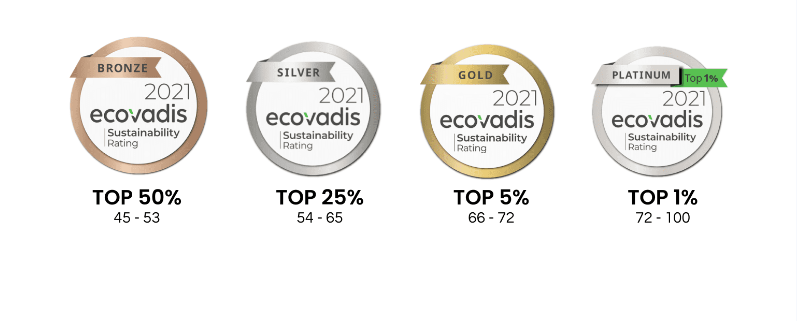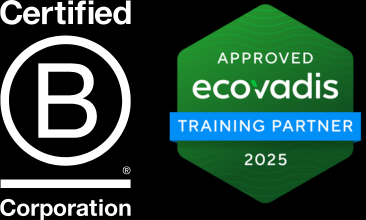While companies are increasingly publishing ESG reports and working on their reporting methodologies, the significance of sustainability ratings is rising. Their importance for companies is pivotal, as they attract investors, help to manage potential risks, ensure regulatory compliance, bolster public reputation and mainly offer a transparent assessment of your efforts in the field of sustainability and ESG.
In our article ESG ratings: How to navigate the maze, we looked into the complex ecosystem of sustainability ratings, giving you an insight into what is actually measured with ESG scores, which criteria are generally taken into account, how various ratings differ in the methodologies they use and what we can expect from the upcoming EU legislation that aims to regulate ESG rating providers and to introduce higher transparency in this market.
Now we are going to focus on one rating in particular - EcoVadis. Established in 2007, EcoVadis is a comprehensive sustainability rating tool assessing environmental, social, and ethical performance of a company, based on a thorough analysis of both internal and external documentation. The following text delves into the methodology, suitability, and benefits of the EcoVadis rating, shedding light on its assessment process and requirements.
Suitable companies: Who can apply?
EcoVadis offers a versatile framework suitable for a wide spectrum of companies across various industries. Regardless of their size, from small enterprises to multinational corporations, businesses seeking to align their operations with sustainable practices can benefit from undergoing this rating.
This is a great benefit of choosing EcoVadis - there is no one standardised questionnaire, quite on the contrary, the questions and topics which you have to answer are customised based on your company’s size, industry sector and location of operations. You can undergo the assessment on both a subsidiary and/or group level, whichever is suitable for your situation. Someone might want to evaluate a whole group of entities, while others can opt for assessing only one specific operational site. Depending on your decision and needs, you are then required to submit corresponding documentation. Furthermore, the Ecovadis framework caters to both buyers and suppliers in global supply chains, enhancing transparency and accountability throughout the value chain.
Methodology: What is measured?
EcoVadis methodology reflects existing international sustainability standards such as UNGC, GRI, ISO and others. Using these standards, EcoVadis has identified 21 indicators divided into four main categories.
Environment
This part evaluates a company's ecological footprint, resource efficiency, and efforts to mitigate environmental impacts. By scrutinising a company's approach to environmental stewardship, EcoVadis assesses the extent to which it aligns with global sustainability goals and practices. It includes analysing
- greenhouse gas emissions and energy consumption,
- water use,
- initiatives to conserve biodiversity,
- waste management practices,
- local and accidental pollution.
Labor & Human Rights
The social dimension focuses on the treatment of employees, fair labour practices, and human rights protection. EcoVadis places significant emphasis on ensuring that companies create an environment where people are respected, supported, and empowered. This involves examining
- workplace conditions,
- health and safety measures,
- social dialogue,
- career management and training,
- diversity and inclusion policies,
- protective measures preventing child labour, human trafficking and other violations of human rights.
Ethics
This section encompasses a company’s commitment to transparency, responsible governance, and ethical business conduct. By assessing these aspects, the rating promotes accountability, integrity, and ethical behaviour at all levels of the organisation. The main topics evaluated are
- corruption,
- anticompetitive practices,
- information management.
Sustainable Procurement
The last category examines a company's impact beyond its immediate operations. This underscores the interconnectedness of global supply chains and the importance of responsible sourcing. It means assessing supplier engagement and the broader societal and environmental implications of a company's procurement decisions.
Scoring principles: How is it measured?
EcoVadis employs a scoring methodology that considers both the company's absolute performance and its relative performance within its industry. The scores can range between 0 and 100 and the EcoVadis evaluators first assign scores to separate criterions (policies, endorsements, measures, certifications, reports, external sources). These criterions have different weights in the calculation of the final score which gives a holistic snapshot of the overall sustainability efforts of a company.
To analyse each of the above mentioned indicators, EcoVadis looks at several aspects of sustainability management:
1 Policies in place
This includes formalised documentation outlining a company’s sustainability objectives as well as the presence of monitoring and reporting tools to track progress of specified targets. Another aspect falling under this criterion are public endorsements of initiatives like the UN SDGs, the UN Global Compact, or CDP.
2 Actions taken
After policies have been set, concrete measures must be implemented. This is key in the evaluation. Next to the measures, what also plays a part, are acquired certification such as ISO 14001 (environmental management), ISO 27000 (information management), ISO 45001 (health & safety), ISO 37001 (anti-corruption), etc. These can significantly help in achieving better results.
3 Results reported
Implemented measures have to be regularly evaluated and reported on, in order to monitor progress towards the set of objectives. Evaluators are interested not only in KPIs, but also in how KPI-based performance is communicated towards stakeholders. Lastly, EcoVadis has set up its so-called 360° Watch which is an AI tool that monitors all kinds of news related to the company’s activities. It scans publicly available information like legal settlements, official statements of administrative bodies, credible media, recognised NGOs, etc.
Certification process: What is going to happen?
The process of obtaining an EcoVadis rating is a structured journey consisting of several steps.
1 Registration: you need to register your company on the online EcoVadis platform. Based on the information you provide, a customised assessment questionnaire will be tailored to your business.
2 Questionnaire: you are asked to provide comprehensive data and underlying documentation related to specific topics. To gather all necessary documentation, you should get your whole team on board and involve those with access to key information (e.g. an HR manager might be the most suitable person to provide documents covering employee-related topics). The documents you upload on the platform must follow certain requirements concerning their format and relevance. You have about a month to complete the questionnaire, however, in case you need more time, it is possible to contact the EcoVadis support team and ask for a deadline extension.
3 Assessment: after questionnaire submission, the evaluators have ca. 6-8 weeks to review and validate your documentation.
4 Results: you will be notified about your result via email and you can check the score on your personal profile. EcoVadis provides a detailed explanation presented in a comprehensive scorecard. You can see how you scored overall as well as in each category, what has been considered your strength and where you are lagging behind. Ecovadis is designed to promote an ongoing improvement, therefore, companies are encouraged to implement the feedback and recommendations received to enhance their performance in subsequent years. Depending on your subscription, you are able to share your results publicly, e.g. for marketing and promotion purposes. Results are valid for one year. Moreover, if you score high in the assessment (above 47 and not lower than 20 in any individual category), you can be awarded an EcoVadis medal - bronze (top 50% of companies; score 47-55), silver (top 25%; score 56-66), gold (top 5%; score 67-74), platinum (top 1%; score 75-100).
2 Questionnaire: you are asked to provide comprehensive data and underlying documentation related to specific topics. To gather all necessary documentation, you should get your whole team on board and involve those with access to key information (e.g. an HR manager might be the most suitable person to provide documents covering employee-related topics). The documents you upload on the platform must follow certain requirements concerning their format and relevance. You have about a month to complete the questionnaire, however, in case you need more time, it is possible to contact the EcoVadis support team and ask for a deadline extension.
3 Assessment: after questionnaire submission, the evaluators have ca. 6-8 weeks to review and validate your documentation.
4 Results: you will be notified about your result via email and you can check the score on your personal profile. EcoVadis provides a detailed explanation presented in a comprehensive scorecard. You can see how you scored overall as well as in each category, what has been considered your strength and where you are lagging behind. Ecovadis is designed to promote an ongoing improvement, therefore, companies are encouraged to implement the feedback and recommendations received to enhance their performance in subsequent years. Depending on your subscription, you are able to share your results publicly, e.g. for marketing and promotion purposes. Results are valid for one year. Moreover, if you score high in the assessment (above 47 and not lower than 20 in any individual category), you can be awarded an EcoVadis medal - bronze (top 50% of companies; score 47-55), silver (top 25%; score 56-66), gold (top 5%; score 67-74), platinum (top 1%; score 75-100).
Benefits: Why should you choose EcoVadis?
All in all, the EcoVadis methodology is not only an assessment tool, but also a guide for companies to identify areas for improvement, set goals, and contribute to a more responsible and ethical business environment.
There is a plethora of ESG ratings you can choose from, however, we recommend EcoVadis especially to smaller companies because of the customization of questionnaires which take into account the fact that a company of 10 employees likely does not have as exhaustive internal regulations as a company of 200 people. For instance, rules for documents provided by XS companies are slightly more lenient.
Here are a few other highlights which may help you make your decision:
- user-friendly platform, very easy to access,
- a lot of online guides and materials to help you navigate the whole process,
- transparent methodology,
- good customer support,
- documents are accepted in all languages,
- assessment is available at anytime throughout the year,
- recommendations for future improvements,
- access to e-learning courses via EcoVadis Academy.
Ready to get started? Contact us, and we will guide you through the ESG rating process. More information about our services HERE.
Resources and further information
(Image by Apiday)


